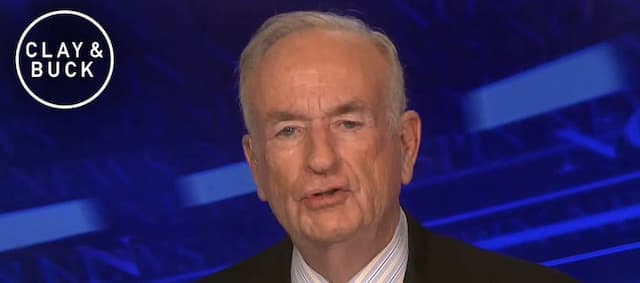C&B Break Down Biden’s Student Loan Scheme
BUCK: We haven’t yet talked about the Biden move here on student debt, which I think is something we might spend a little more time on this one tomorrow, but to me, it is remarkable. So, what I was saying to you before, Clay, about are they really just going to double down on all the things they’re doing that are causing the problem in the first place, I think in many…
They won’t do that on crime, they’re not gonna double down on the craziest progressive policies. They’re gonna head fake. They’re gonna move a little bit away from that, ’cause that’s just too politically catastrophic for them. They’re gonna try to hide the truth at the border. They’re just gonna try to prop up the economy, and I think there’s also just a willingness to try to buy off voters with dollars from the federal government. And, in this case, I didn’t realize, it’s up to $1.7 trillion of student loan debt right now that is outstanding.
CLAY: Crazy.
BUCK: This would affect 40 million people, they say, if he decides to go all out and just waive… I mean, first of all, how could he even do this, really?
CLAY: I don’t think it’s constitutional.
 BUCK: Explain. Give me more on that.
BUCK: Explain. Give me more on that.
CLAY: I did the research for Marjorie Taylor Greene because I was like I gotta know what procedures they’re applying here. So let me say off the top, I’m not claiming to be an expert in the law that surrounds student debt. But in general, I don’t believe — given the amount of money that is at stake, we’re talking about $1.7 trillion — that through an executive action, Joe Biden could do this without congressional approval.
So what he’s talking about doing is taking all of the federal student loan dollars and he’s not… They say “cancel it.” It’s not canceling it. It’s taking the obligation off of the people who made the obligation, right, who took out the debt and go to school and putting it on all taxpayers. So you and me who may have played off or student loans — and I did.
I paid off my student loans for going to law school. We don’t get any benefit from this, but we take all the obligation. So it violates, I believe, the law in general on the first place because the obligated party here is taken off. And, by the way, the obligated party might also have an obligation to pay taxes on this because it would count potentially as an income benefit for them which is a complexity here. But on top of that, the Congress has to act in order to take this $1.6 trillion or $1.7 trillion, ’cause the money was spent, the schools were the beneficiaries. I don’t believe that he can do that by executive action.
BUCK: If you look at the amount of money that it costs to go to a four-year state college now versus what it cost let’s say $30 years ago, these universities, the school system has just been gorging itself at the trough of federal dollars provided to all these kids to go. This has become this enormous system, and about it we’re gonna even have a discussion about debt forgiveness, right now you want to talk about inflation and ways to not help.
This would not help, but the notion you’re not gonna dramatically overhaul the university system in this country strikes me as just reckless. It’s just reckless, but I think they’re okay with recklessness, but I also say, Clay, if they’re gonna waive $1.7 trillion. The entire national debt at the end of 2000 was $5 trillion. We’re just gonna be like, “Oh, yeah, $1.7 trillion that’s owed back the federal government? No big deal.” Crazy.
 CLAY: It’s a crazy proposition. Here’s one also response. I don’t think it’s like constitutional. But if he tries it, you challenge it constitutionally, I think you also demand repayment from all these schools. Because effectively we’re just giving them a $1.7 trillion subsidy which was never voted on. I think it’s crazy. I think what Biden is trying to do is get this through to get the votes even though he knows it’s not constitutional. That would be my best political analysis mixed with the legal.
CLAY: It’s a crazy proposition. Here’s one also response. I don’t think it’s like constitutional. But if he tries it, you challenge it constitutionally, I think you also demand repayment from all these schools. Because effectively we’re just giving them a $1.7 trillion subsidy which was never voted on. I think it’s crazy. I think what Biden is trying to do is get this through to get the votes even though he knows it’s not constitutional. That would be my best political analysis mixed with the legal.





